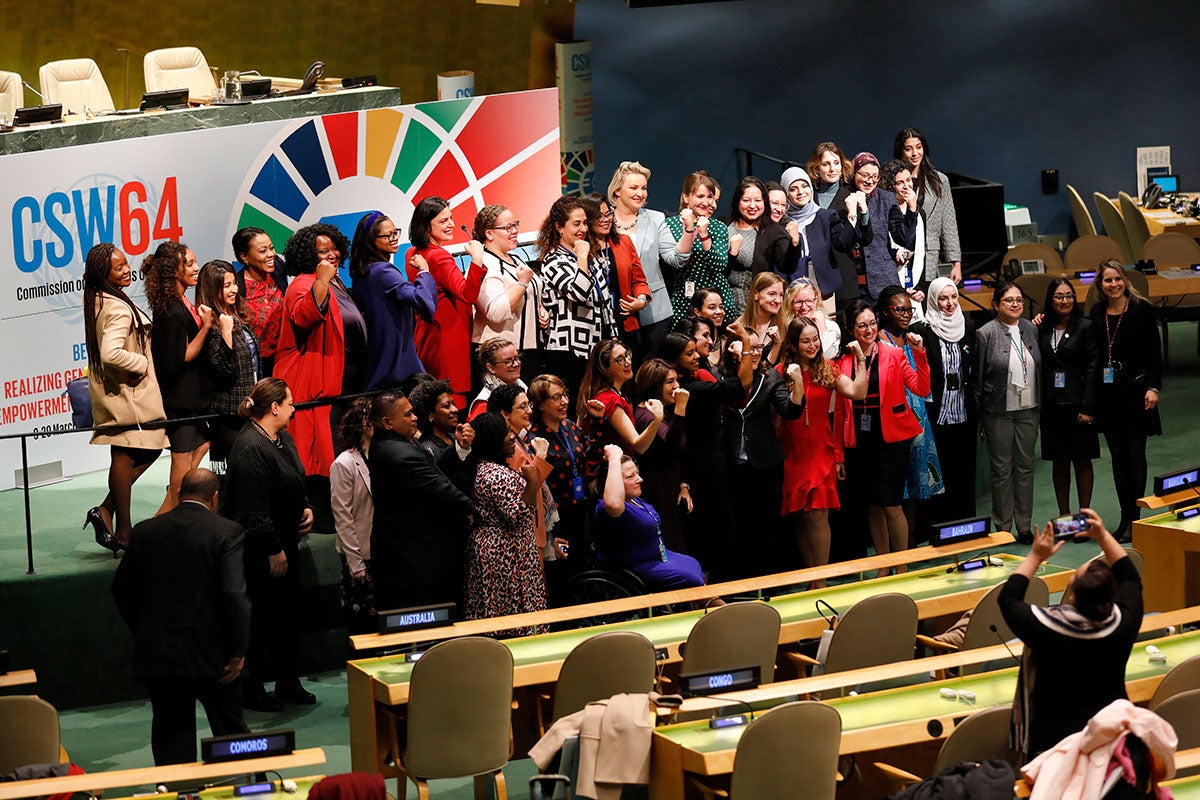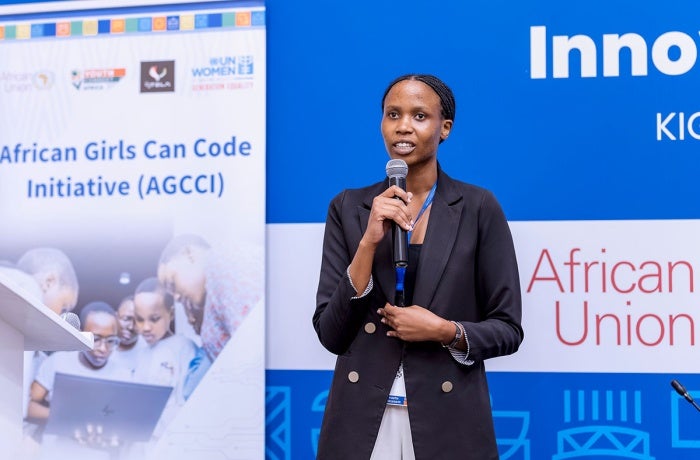Your guide to CSW67
Everything you need to know about the largest global gathering of gender equality champions at the United Nations, starting 6 March.
In March of every year, activists, advocates, experts and governments from around the world come together for the annual meeting of the Commission for the Status of Women (CSW). The 67th CSW session, 6-17 March 2023, the first in-person CSW since 2019, will convene under the theme: “Innovation and technological change, and education in the digital age for achieving gender equality and the empowerment of all women and girls.”
Held in New York, CSW is the largest gathering of feminists, academics, government officials and policy makers to take stock of gender equality progress, renew their collective purpose, and chart a new roadmap forward.
The Commission consists of a wide range of meetings and engagements with stakeholders including expert panels, interactive dialogues, ministerial round tables, youth interventions and critical inputs from substantive experts. And each year CSW is a uniquely fruitful and fortifying moment for feminists from around the world. Whether you’re moderating a discussion, attending a side event or staying on top of the gender equality agenda through livestreams and social media updates, here’s what you need to know about CSW:

What’s the history of CSW?
The first Commission dates back to 1947, just two years after the founding of the United Nations, when a group of 15 women representing governments from around the world met in New York to begin building the international legal foundations of gender equality.
These trailblazing women leaders took on projects to raise global awareness of women’s issues and change discriminatory legislation. For instance, the Commission contributed to the drafting of the Universal Declaration of Human Rights, argued against references to “men” as a synonym for humanity, and negotiated more gender-inclusive language. It drafted the early international conventions on the political rights of women, women’s rights in marriage, the right to equal pay for equal work and more.
In the following decades, the Commission organized four World Conferences on Women, established several UN offices dedicated to various aspects of women’s rights (which merged to form UN Women in 2011), and shifted to positioning women’s issues as central to international development concerns.
Now, the Commission takes the lead in strengthening, deepening and expanding the global framework for gender equality and monitoring the implementation of agreed-upon actions. For more on the Commission’s history, progress and roles, click here.
Why is CSW relevant today?
Since CSW’s inception, monumental progress has been made to integrate gender equality into mainstream international thought and action. Yet, women and girls around the world continue to face disproportionate burdens, gender biases and systemic discrimination, which hinder their autonomy, impede their access to justice and obstruct their fundamental human rights.
Globally, we’re still centuries away from gender equality. Estimates say it will take up to 286 years to close legal gaps and remove discriminatory laws, 140 years for women to be represented equally in positions of power and leadership at work, and at least 40 years to achieve equal representation in national parliaments. As of the end of 2022, it’s estimated that around 383 million women and girls live in extreme poverty. And every 11 minutes, a woman or girl is killed by someone in her own family.
As the world faces intersecting global crises, including the COVID-19 pandemic, the cost-of-living crisis, heightened armed conflict and climate change, women and girls are enduring different and disproportionate impacts. Women lost an estimated USD 800 billion in income in 2020 due to the pandemic, and their participation in labour markets is lower than it was pre-pandemic.
In line with this year’s theme of technology and innovation for women and girls’ empowerment, CSW67 is a key moment to take stock of technological progress and ensure that its rapid advance is not leaving women and girls behind. Now is the moment to adopt a human-centric approach to digitalization and ensure that the feminist principles of inclusion and intersectionality are guiding forces in technological innovation.
We urgently need action to close the gender gaps in digital access, shape inclusive innovation ecosystems, embed gender perspectives across design, development and deployment of tech and innovation and eliminate technology-facilitated gender-based violence. For more on how we can create an equitable digital future, click here.
What’s on the agenda for CSW67?
As CSW returns for its first in-person gathering since 2019, it’s a jam-packed agenda for both the official sessions and side-events.
On the morning of 6 March 2023, the Commission will open the session, elect officers and begin to discuss how innovation, technology and education in the digital age can and should be tools for women’s empowerment.
Over the next several days, they’ll look at best practices and policies for: addressing the gender digital divide, promoting education in the digital age, fostering inclusive innovation and technological change for empowering women and girls, and creating safe and inclusive online spaces. For the first time this year, CSW will engage young people to participate fully in dialogues with decision-makers, opening the space for their voices to be heard at the highest levels and the inputs be reflected in the outcome. There will also be a break in official meetings to commemorate International Women’s Day on 8 March.
Experts will weigh in, representatives of non-governmental organizations will deliver statements, and by the end of the second week, the Commission will agree upon a set of conclusions that will serve as the blueprint for improving the lives of women and girls through innovation, technology and education in the digital age.
In tandem with the Commission’s session, Member States, UN entities and NGOs will host hundreds of side events to rally around critical gender equality issues. These side events will include feminist speakers and experts from around the world and cover a variety of topics including using tech and innovation to accelerate progress for women and girls, women’s digital rights and access, youth participation in tech spaces and more.
UN Women is organizing and attending key side events, including:
- Open, Safe and Equal—Shaping a Feminist Digital Future
- CSW67 Youth Forum
- Interactive Youth Dialogue
- Solutions to Strengthen Civic Space & Women's Digital Rights: Addressing the pushback against Gender Equality
The full list of side events is available here.









